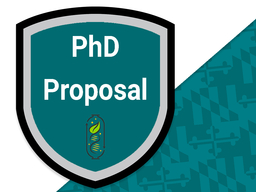PhD Proposal: Vida Rahmatnejad
FORMAT: VIRTUAL PRESENTATION
Location
Online
PhD Proposal: Vida Rahmatnejad – Online Event
Date & Time
May 20, 2022, 1:30 pm – 2:30 pm
Description
Vida Rahmatnejad, PhD Student
Advisor:
Dr. Govind Rao
Noninvasive Process Monitoring for Cell Therapy Applications
Abstract:
Cell therapy is a therapy where cellular materials are injected, grafted or implanted into the body of the patient in order to effectuate medicinal effect. This method is increasingly becoming a part of the medical practice and has applications in various diseases ranging from diabetes and wounds of soft tissues to nervous system, genetic disorders and cancer. Despite the promising effect that cell therapies have, they are associated with significant issues such as having poorly defined manufacturing processes, lack of effective small-scale models, and high costs. Manufacturing cells for cell therapies is a delicate process and is associated with modifications to the cells at specific time points. Cell culture is the longest step throughout the manufacturing process, and cell characteristics could be affected during this step. The fact that cell quality is a critical factor defining the therapeutic efficacy of cell therapies makes cell culture one of the most critical steps in the manufacturing process of cell therapies. Manufacturing tools such as bioreactors are valuable platforms for cost-effective and consistent production of cell therapies as they maintain the culture environment. In addition, monitoring cell culture processes is an essential factor in achieving the optimal performance and consistency. Monitoring normally happens by placing sensors inside the cell culture environment and tracking the changes in different parameters such as temperature, pH and dissolved oxygen (DO). Application of sensors helps in improving cell expansion, optimizing the product, enhancing the process yield, identifying the problems and mitigating them at early stages. Additionally, monitoring systems are helpful in simplifying the process validation, and improving the reproducibility of the production. Despite the aforementioned advantages of monitoring systems, the presence of sensors in cell culture environment could result in contamination. Contamination in cell therapy products compromises the product quality and causes immunogenic risks in patient. Given the fact that these products cannot be terminally sterilized because of their large size and being fragile, eliminating the risk of cross-contamination during the cell culture process is more critical compared to other biologics. Therefore, studies suggest minimizing open processes as a solution for this problem as exposure of cell culture to the environmental sources is one main reason for contamination. Considering these facts, a system capable of monitoring cell culture parameters in a noninvasive way would be optimal as it enhances the process and eliminates the risk of contamination associated with invasive sensors. The noninvasive term refers to the measurements of different parameters without direct contact with the cell culture environment. This monitoring system becomes specifically helpful in circumstances that malfunction is observed in the sensor. In such condition, the sensor will be easily replaced eliminating loss of data. This is another advantage of a noninvasive monitoring system. The noninvasie process monitoring method could specifically be beneficial for cell culture processes in cellbag bioreactors. This type of bioreactor is mainly used for culturing shear sensitive cell types such as T cells. To minimize the shear stress, a rocking motion is used to gently mix the cell culture medium. The rocking motion applied to the cellbag results in the movement of the liquid covering sensors attached to the bottom of the bag. The changing location of the liquid leads to more monitoring challenges compared to stirred tank bioreactor.To address the aforementioned issues, a method for noninvasive measurement of dissolved oxygen (DO), dissolved carbon dioxide (DCO2), and pH will be proposed. The term noninvasive refers to “no direct contact with the cell culture environment” and this is achieved by conducting the measurements through semi-permeable membranes. The measurements will happen based on similar principles used in DO, pH and DCO2 sensors previously developed at Center for Advanced Sensor Technology (CAST). However, different approaches are used to develop noninvasive measurement methods.
Agenda:
- 1:15 pm: Meeting room will open
- 1:30 pm: 45 min presentation will be open to the public with Q&A.
- Followed by a closed session with the committee and PhD Student.
WEBEX Meeting:
